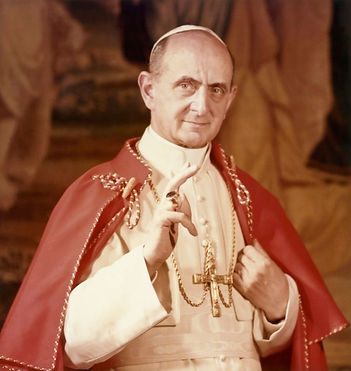
OLD CATHOLIC CHURCH IN THE UNITED STATES
OLD CATHOLIC CONFEDERATION

The Old Catholic Confederation and the Roman Catholic Church
Concerning the Vatican Document, "Dominus Iesus"
On 16 June 2000, Pope St. John Paul II promulgated the document, Dominus Iesus: On the Unicity and the Salvific Universality of Jesus Christ and the Church," produced by the the Congregation for the Doctrine of the Faith, which affirmed the validity of the Holy Orders and Sacraments of the Old Catholic Churches. This document was signed by the Prefect of the Congregation at the time, Cardinal Joseph Ratzinger (later Pope Benedict XVI) and Cardinal Tarcisio Bertone, then Vatican Secretary of State. The document addresses the ancient dogma, "Extra Ecclesiam Nulla Salus" ("no salvation outside of the Church")
"The Churches which, while not existing in perfect communion with the [Roman] Catholic Church, remain united to her by means of the closest bonds, that is, by apostolic succession and a valid Eucharist, are true particular Churches."
"Therefore, these separated Churches and communities as such ... have by no means been deprived of significance and importance in the mystery of salvation. For the Spirit of Christ has not refrained from using them as means of salvation which derive their efficacy from the very fullness of grace and truth entrusted to the Catholic Church." IV. Unicity and Unity of the Church, 17
Concerning the Code of Canon Law of the Roman Catholic Church
Canon 844, section2. states: "Whenever necessity requires or genuine spiritual advantage suggests, and provided that the danger of error or indifferentism is avoided, it is lawful for the faithful for who it is physically or morally impossible to approach a [Roman] Catholic minister, to receive the sacraments of penance, Eucharist, and anointing of the sick from non [Roman] Catholic ministers in whose churches these sacraments are valid." (This Canon directly refers to Old Catholic and Orthodox priests, which is affirmed in the above statement and in countless other statements made by the Holy See.)
The Position of Eastern Orthodox Churches, Oriental Orthodox Churches and Old Catholic Churches with regard to Roman Canon Law
All of these statements above refer to the Eastern Orthodox Churches, the Oriental Orthodox Churches and the Old Catholic Churches. Since the Old Catholic Churches of the of the Old Catholic Confederation maintain Apostolic Succession, the orthodox Catholic faith and ancient discipline, it is regarded in the same way as the Orthodox Churches. Like Eastern Orthodox Churches, Old-Catholics do not accept the modern dogmas of papal universal supremacy and infallibility.
Concerning the Old Catholic Confederation
Concerning the Old Catholic Confederation

Since the Episcopal lineage and Apostolic Succession of the Old Catholic Confederation derives directly from Pope St. Paul VI through Archbishop Emmanuel Milingo, Roman Catholic Archbishop Emeritus of Lusaka in Zambia, who consecrated Archbishop Peter Paul Brennan, the OCC hierarchy shares the same episcopal lineage of ninety-five percent of all Roman Catholic bishops around the world deriving from Scipione Cardinal Rebiba, who was consecrated in 1541.
As such, the Old Catholic Church in the United States and the Roman Catholic Church are united by Apostolic Succession and in the mysterious unity of the Holy Eucharist.
Further, while the Old Catholic Church in the United States does not accept the modern doctrine of papal infallibility, it holds the pope, the bishop of Rome, in high esteem.
At the age of thirty-nine, Archbishop Milingo was one of the youngest priests to be consecrated a bishop in the Roman Catholic Church by Pope St. Paul VI in 1969, appointing him at that time Archbishop of Lusaka in Zambia. Archbishop Milingo served in that post for fourteen years before retiring in 1983.
In his retirement, Archbishop Milingo frequently criticized the Church for its forced discipline of celibacy for secular clergy that he thought resulted in needless moral scandal. Then, in 2001, he argued that the Church should dispense secular priests from celibacy; and in the same year, he himself made the radical decision to marry after forty-three years of celibacy. But, at the request of then Pope St. John Paul II, Archbishop Milingo spent a year separated from his wife doing penance in prayerful reflection at a Capuchin monastery in Argentina.

The late venerable Archbishop Peter Paul Brennan, Archbishop Emeritus and Bishop Emeritus of New York of the Old Catholic Confederation, was known globally as an advocate for social justice. The Archbishop's central point of contention with the Roman Catholic Church was the prohibition against married clergy. Like Archbishop Milingo, Archbishop Brennan was a great advocate for the married priesthood and episcopate, who spent thirty years of his life providing pastoral care to former Roman Catholic priests around the world who were forced to leave active ministry in order to pursue the calling of marriage. Later, Archbishop Brennan also objected to the modern doctrines of papal supremacy and papal infallibility, arguing for a restoration of the orthodox faith, a more democratic Church polity and an embrace of the modern world. Finally, he understood the OCC as a Prelature for Old-Catholics in order to live an authentic Christian life until we can be reconciled with the Church of Rome.
But, in 2006, Archbishop Milingo returned to his wife and at a press conference in Washington, DC announced that he was commencing a new ministry to restore married priests to service to the Church. Then, on September 24, 2006, Archbishop Milingo consecrated Archbishop Peter Brennan along with three other married priests to the holy Episcopate. Two days later, on September 26, 2006, the Holy See issued a statement saying that Archbishop Milingo had automatically incurred excommunication (latae sententiae)in accordance with canon 1382 of the 1983 Code of Canon Law. Finally, on December 17, 2009 the Press Office of the Holy See announced that Archbishop Milingo had been reduced to the lay state.

His Grace, The Most Rev. Peter Paul Brennan, D.D.
November 1, 1941-August 1, 2016
Concerning Archbishop Emmanuel Milingo

